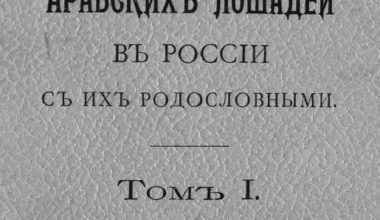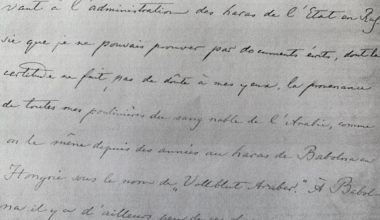Edited by Edouard Al-Dahdah. Transcribed and translated by Margaret Lolley. Editors note by Lyman Doyle. Unpublished. British Library.
Editor’s Note
This content below was taken from a draft letter written by Wilfred Blunt in reply to Roman Sanguskzo’s letter of 4 November 1899. Wilfred Blunt was preparing to go to Egypt at this time and it appears he sent the final version of this letter on 15 December before sailing for Egypt. The date of the 15 December is taken from Roman Sanguszko Jr’s reply to this letter. Presumably, Wilfred arrived in Egypt right before Christmas and informed Lady Anne of his letter to Sanguszko.
Lady Anne writes in her journal on 24 December 1899: “This day W. replied to Prince Sanguszko’s questions giving his opinion. This was advice to keep his own Slawuta Stud aloof from the new Russian Stud book Arabs as that long established Stud could gain nothing and might lose by being merged into the general official enterprise. It is strange that Prince Sanguszko should be able to prove only 2/3 of Arab blood as certain in his breed whose pedigrees have been carefully kept for 75 years.”
The 15 December letter is not known to exist. It might have been slightly different than the text below as some of Roman Sanguszko’s letter of 28 December 1899 alludes to information present in the final letter but not mentioned below.
Transcription
Telegrams & Station
Southwater
2 Miles
Newbuildings Place
Horsham,
Sussex
Le 22 novembre 1899
Cher Prince,
Avant de partir pour l’Egypte, où je dois la rejoindre prochainement, ma femme m’a prié de répondre en ce qui me concernait à votre aimable lettre.
Mon avis sur l’utilité des Stud Books est un peu douteux. En principe il est sans doute un avantage d’établir un registre officiel de tous les chevaux produits dans le pays. Mais pour les chevaux Arabes il y a des difficultés spéciales qui à mon avis en neutralisent le bien au point de vue de la race et d’intérêt de l’éleveur sérieux. Nous en avons déjà l’expérience en Angleterre, et cette année même j’ai été consulté confidentiellement par M. Weatherby, Rédacteur General du Stud Book, qui se plaignait de l’inscription obligée et toujours croissante de bêtes d’origine douteuse importées de l’Orient sur la foi de certificats impossible à vérifier. La raison en est, à ce qu’il parait que, chez nous l’inscription d’un cheval dans le Stud Book ajoute tout de suite à sa valeur et des personnes peu scrupuleuses les font ainsi inscrire chez Weatherby uniquement dans ce but. C’est surtout avec les poulinières que cela se fait à cause de leurs produits qui deviennent ainsi “thoroughbred”, quelque soit leur provenance.
Pour les thoroughbred Anglais, dont l’unique valeur est de bien courir, le mal dans l’opinion de M.W. n’est pas très grand, parce que les produits des mères demi sang ne peuvent jamais transmettre la vitesse nécessaire pour rien gagner aux poulains, et les éleveurs, voyant cela, ne persistent pas longtemps à les employer dans les haras. Mais avec les chevaux Arabes qui ne subissent aucun épreuve publique en fait de courses, le sang douteux ainsi introduit pourrait continuer longtemps sans se faire rejeter. Voilà la difficulté pratique. On trouve tout à fait impossible de distinguer les bons certificats d’origine des faux, ni d’inventer un règlement suffisamment sévère pour les démêler.
Autrefois, on prenait comme suffisante pour les arabes une signature consulaire, mais on reconnait maintenant que ces signatures ne valent rien. Les drogmans dans tous les consulats du Levant font un métier d’écrire les certificats voulus par les marchands de chevaux de leur nation, et le Rédacteur du Stud Book qui les reçoit ne peut faire autrement que d’inscrire aveuglement. Je suis prêt à croire qu’en Russie* où il y a fort peu d’éleveurs et où tous sont plus ou moins grand seigneurs et éleveurs sérieux le mal soit minime. Mais je vous le signale comme un danger qu’il faut prévoir si on ne peut le prévenir. L’élever sérieux est touché en ce que le Stud Book officiel met tous les chevaux inscrits sur le même niveaux d’authenticité, les bons avec les mauvais.
Malgré tout cela, je crois que chez vous l’avantage d’un Stud Book patronné par le gouvernement doit prévaloir et que vous avez sagement fait de l’approuver. Ce que je viens de vous dire et plus ou moins confidentiel, vu que ma conversation avec Weatherby le fut.
Je vous prie, cher Prince, de croire au grand intérêt que je prends au Stud de Slavuta qui m’a laissé un souvenir des plus vifs comme le plus beau que j’ai vu en Europe ainsi de mon dévouement le plus sincère.
WSB
[*Vous savez bien le mal qu’on a en Orient à s’assurer des pedigrees présentés par les marchands, et la difficulté devient bien plus grande en Europe]Translation
22 November 1899
Dear Prince,
Before leaving for Egypt, where I will meet her soon, my wife asked me to respond to what concerned me in your kind letter.
My opinion on the utility of Stud Booking is a little dubious. On principle, it is without a doubt an advantage to establish an official registry of all the horses produced in the country. But for the Arab horses there are special difficulties that in my opinion neutralize the benefit from the point of view of the breed and the interests of the serious breeder. We have already had the experience in England, and this very year I was confidentially consulted by M. Weatherby, Registrar General of the Stud Book, who complained of the mandatory and ever-growing registration of animals of questionable origin imported from the Orient, with certificates that are impossible to verify. The reason for this appears to be that, over here, the registration of a horse in the Stud Book immediately adds to its value, and unscrupulous people hence register them with Weatherby for this reason only. This mostly occurs with the broodmares because of their offspring which therefore become “thoroughbred”, regardless of their provenance.
For the English Thoroughbreds, whose sole value is in running well, the danger, according to M.W., is not very big, because the products of half-blood dams can never transmit the necessary speed for the foals to win, and the breeders, seeing this, do not persist in using them in the studs for long. But with the Arab horses, which undergo no public tests in terms of racing, the questionable blood thus introduced can continue for a long while being rejected. Therein lies the practical difficulty. We find it completely impossible to distinguish the authentic certificates of origin from the fakes, as well as to invent regulations stringent enough to sort them out.
Before, we considered a consular signature to be sufficient for Arabs, but we now recognize that these signatures are worthless. The dragomans in all the consulates of the Levant make a business out of delivering the certificates requested by the horse merchants of their nation, and the registrar of the stud book who receives them has no choice but to blindly register them. I am ready to believe that in Russia* where there are very few breeders and where all are more or less men of dignity and serious breeders, the harm would be minimal. But I signal this as a danger that must be foreseen if it cannot be prevented. The serious breeder is affected in that the official Stud Book puts all registered horses on the same level of authenticity, the good ones with the bad.
Despite all this, I believe that for you the advantage of a Stud Book sponsored by government should prevail and that that you acted wisely in approving of it. What I just told you is more or less confidential, since my conversation with Weatherby was such.
I implore you, dear Prince, to believe in the great interest I take in the Slavuta Stud that left me a most vivid memory as the most beautiful that I had seen in Europe, as well in my most sincere devotion.
WSB
[*You know well the trouble we have in the Orient to assure ourselves of the pedigrees presented by the merchants, and the difficulty is greater in Europe]

